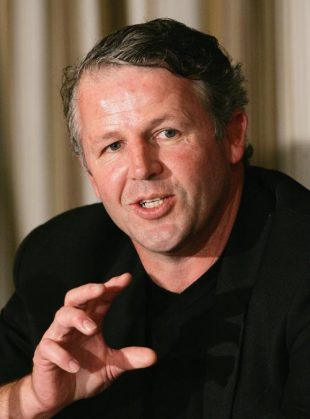|
English Rugby
Foreign influence debate rumbles on
Scrum.com
November 27, 2008

Fitzpatrick led the All Blacks for a record 51 times during his international career
© Getty Images
Enlarge
Former All Blacks captain Sean Fitzpatrick has backed All Blacks coach Graham Henry's claim that foreign imports are harming the English game. The record 42-6 mauling Martin Johnson's side suffered at the hands of South Africa at Twickenham last weekend triggered an immediate media investigation into the state of English rugby with much of the comment placing focus on foreign influence in English rugby's top flight. "The RFU (Rugby Football Union) has to work out what's best for the game," said Fitzpatrick, who led the All Blacks 51 times in 92 Tests. "Does it want England to be the number one product or for the Premiership to be the best product? That's the decision that has to be made." New Zealand witnessed a mass exodus after last autumn's World Cup - losing proven internationals such as Luke McAlister, Carl Hayman and Chris Jack to English shores. A total of nine members of New Zealand's 2007 World Cup squad took up lucrative European club contracts. Hayman, a prop, is reported to be on £350,000 a year at struggling Newcastle and although the All Blacks have shrugged off those loses he believes that it will have a detrimental effect on England. Henry believes their presence is denying young players the chance of gaining crucial big-game exposure. "It's about getting the opportunity to play at the top level," he said. "When you continue to fill up the Premiership with New Zealanders and the English guys don't get a chance then the national side is going to suffer. The best way is to stop all of the Kiwis coming over." Former England coach SIr Clive Woodward was also quick to point the finger following last weekend's humiliating loss at England's HQ. "You have to take a step back and look behind the scenes -- at the coaching and the management of the team," he said. "What's happened since 2003? Where has the development of players gone?" Premier Rugby have also entered the debate, declaring, "Due to EU legislation, the Premiership cannot legally prevent the majority of non-English players from playing in the league. Only a small number of players are deemed to be 'foreign' and these players are limited in the Premiership to two in any match day squad. "In 1996/97, the season before the Premiership began, the percentage of English players in Premiership squads was 64%. In 2003/4, the season when England won the Rugby World Cup, that percentage was marginally higher at 65%. In 2007/8, the year of England's next World Cup Final, the figure was still at 64%. And this season, the percentage is also at 64%. In this season to date, 62% of the match day 22s have been English and a further 12% have been either Irish, Scottish and Welsh. "Although the percentage has remained fairly constant, the growth in the size of squads has meant the absolute number of English players has increased. In 1996/7 there were 272 English players in club squads, whilst 10 years later in 2006/7 this number had increased to 325 English players; an increase of nearly 20% in the number of players available for selection for the England team. "Since the Premiership started over ten years ago, clubs have always sought to employ some of the best players in world rugby. Players like Michael Lynagh, Francois Pienaar, Philippe Saint Andre, Thomas Castaignede, Philippe Sella, Pat Lam, Scott Quinnell and Keith Wood have greatly enhanced both the commercial and playing strength of the league, enabling it to grow in the early years. "In recent seasons, clubs have signed world class foreign players at the very peak of their careers; Rico Gear, Carl Hayman, Chris Jack, Butch James, Aaron Mauger and Luke McAlister. These players are recruited to improve their teams, to drive the commercial attraction of the club and the league, but also to improve domestic talent. "At the same time, the Clubs have made a huge investment in the Academy structure since 2001 and the fruits of that system are now being seen with Delon Armitage, Ugo Monye, Toby Flood, Danny Cipriani, Danny Care, James Haskell, Tom Croft, Tom Rees, Nick Kennedy, Lee Mears and Dylan Hartley central to the England team." Commenting on the figures, Phil Winstanley, Rugby Director at Premier Rugby said, "Our clubs are very mindful of their obligation to produce talented English players for the national team and it is something they have invested a large amount of time and money in over the years through the development of Academy athletes. However, it is important that those players play with and against some of the best players in the world to develop their skills and experiences. Only by playing against top class international players, week in, week out, can players improve. "The clubs offer England a conveyor belt of domestic talent to select from, as well as taking advantage of the very best players in world rugby from a playing and commercial perspective for the benefit of the Guinness Premiership." © Scrum.com
|
Live Sports
Communication error please reload the page.
-
Football
-
Cricket
-
Rugby
-
- Days
- Hrs
- Mins
- Secs
F1 - Abu Dhabi GP
Abu Dhabi Grand Prix December 11-131. Max Verstappen ()
2. Valtteri Bottas (Mercedes)
3. Lewis Hamilton (Mercedes)
4. Alexander Albon ()
5. Lando Norris ()
6. Carlos Sainz Jr ()
-
ESPNOtherLive >>
Snooker - China Open
Tennis - Miami Open

